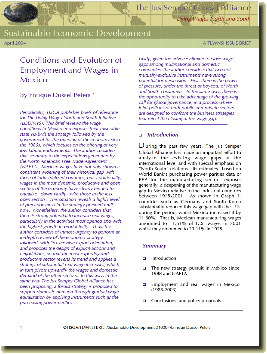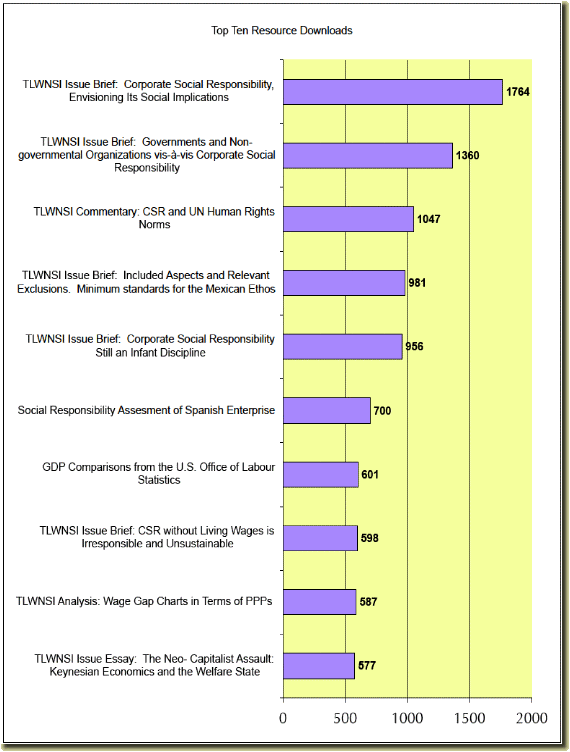 |
In this issue:
CONDITIONS AND EVOLUTION OF EMPLOYMENT AND WAGES IN MEXICO In this TLWNSI Issue Brief, Professor Dussel Peters asserts that, contrary to the expectations generated by the North American Free Trade Agreement (NAFTA), Mexican wages have not only shown a consistent widening of their historical gap with those of industrialized countries, but, additionally, wages in the most dynamic, productive and open sectors of the economy have clearly tended to equalize -downwardly- with those in the less open sectors. This situation reveals a highly level of precariousness in the strategy pursued until now. in the most dynamic, productive and open sectors of the economy have clearly tended to equalize -downwardly- with those in the less open sectors. This situation reveals a highly level of precariousness in the strategy pursued until now.
Nonetheless, the author considers that there is strong potential to increase real wages, particularly in the activities most opened and with the highest growth in productivity. Thus, the author considers of utmost urgency to perform an in-depth review of the economic strategy followed, with its excessive export orientation, and proposes the design of explicit actions and negotiations, so that the most exporting and productive sector reverts its trend and applies a strategy of substantial real-wage increases, which in turn pivots upwardly the wages and domestic demand of the other sectors. In this way, in the same way The Jus Semper Global Alliance has been proposing, a fordist strategy is proposed to support domestic demand through gradual wage equalization by applying instruments such as the purchasing power parities.
Download The Jus Semper Global Alliance's new TLWNSI Issue brief on Sustainable Development.
Read our full issue brief here.
TOP
THE NEO-CAPITALIST ASSAULT IN MEXICO. DEMOCRACY VIS-À-VIS THE LOGIC OF THE MARKET
Álvaro de Regil, Director of The Jus Semper Global Alliance, offers his vision on the long crises of Mexico and its project as a nation. The author tells us that for almost twenty-five years Mexico has walked a path of permanent decline in its human and economic development. The gap between rich and poor has exacerbated to unimaginable levels that take the country back to the early XIX century. In the economic stage, instead of reaching full-blown development, Mexico has been incapable of laying out its own destiny and it is more dependent than ever on the first world and especially on the United States. Instead of developing its own technology, of developing its domestic market and of strategically opening only those sectors where top competitiveness has been reached, its governments have gone down the easy path of speculation, of technology dependency and, especially, of the pseudo-attraction of foreign direct investment by surrendering its labour force for a miserable price. The author asserts that this has been possible because Mexico continues to be a profoundly oligarchic country. incapable of laying out its own destiny and it is more dependent than ever on the first world and especially on the United States. Instead of developing its own technology, of developing its domestic market and of strategically opening only those sectors where top competitiveness has been reached, its governments have gone down the easy path of speculation, of technology dependency and, especially, of the pseudo-attraction of foreign direct investment by surrendering its labour force for a miserable price. The author asserts that this has been possible because Mexico continues to be a profoundly oligarchic country.
The author ponders that, albeit Mexico has finally lived a duly democratic electoral process, it has only vindicated the ruling class so that it can keep subjecting the country to its usufruct and still keep Mexico quite far from real democracy. In this way, this essay reflects on the manner in which the oligarchy operates, and it disserts about its connivance with the first world to impose neoliberalism in Mexico, within a global context, and on how it pretends to consolidate it.
Lastly, the author poses the urgent need to organise a civil society, strong and supportive of the socially disadvantaged, which incorporates all ranks of society, gets fully and permanently involved in the public matter and commits itself to the common good in order to build a real democracy and a new country. Otherwise, he tells us, Mexico would be left to deal with an increasingly brutal ethos -always in a global context- reminiscent of times that were assumed to have been long ago transcended..
Download The Jus Semper Global Alliance's new TLWNSI Issue Essay on Sustainable Development.
Download the issue essay here.
TOP
CORPORATE SOCIAL RESPONSIBILITY IN THE SOUTHERN COUNTRIES: THE OTHER CONTEXT
Presently, CSR criteria are typically defined in the North due to a yet incipient albeit growing participa- tion of the South. The day when CSR acquires in the South a role at least equivalent to that already present in the North seems still distant. Yet, the incorporation of the South to the advancement of CSR is of utmost  importance since many of the topics under discussion in the North have to do directly with the behaviour of its corporations in the South. Thus, it is indispensable for the South to state its views about the responsibilities of multinationals, from its own perspective, so that these are defined not just from the vision of the North's civil society. importance since many of the topics under discussion in the North have to do directly with the behaviour of its corporations in the South. Thus, it is indispensable for the South to state its views about the responsibilities of multinationals, from its own perspective, so that these are defined not just from the vision of the North's civil society.
Without a doubt, the clearest case of the incipient participation of the South in the development of CSR is the topic of living wages. It appears that a theme as critical for the South as the need for its workers to earn a living wage does not seem to receive enough attention in both the North and the South or to have a solution when, in reality, it does and it is viable in the specific context of each country. As Pierre Hupperts, an international consultant on CSR and the author of this commentary, rightly questions, what does CSR pretend but for those working to live in a dignified way from their work? This is the least that would be expected from a "good" CSR policy. For, what if not do the words "Responsibility" and "Social" refer to when speaking about CSR?.
Download our latest commentary on CSR on pdf
TOP
CALIFORNIA'S SUPERMARKET STRIKE: NATIONAL GROCERS TRASH ANY TRACE OF CORPORATE SOCIAL RESPONSIBILITY
There is tremendous potential to tap on consumer support for good corporate citizenship. Nonetheless, the three national grocers involved in the strike chose to join Wal-Mart's famous Darwinian robber baron business culture and contribute to make it the standard in U.S. supermarkets. After nearly five months, despite the  heavy toll that workers and grocers suffered, the three chains ended up achieving their goal, which was to significantly undermine the labour endowments of their workers both short and long-term. This will hurt everyone and not just the workers involved. Profiting over people is a very despicable behaviour that threatens the sustainability of communities. Unfortunately, many modern robber barons of the likes of Wal-Mart have made it a core strategic element of their business. Now Kroger, Safeway and Albertson's have become new members of the robber barons club. heavy toll that workers and grocers suffered, the three chains ended up achieving their goal, which was to significantly undermine the labour endowments of their workers both short and long-term. This will hurt everyone and not just the workers involved. Profiting over people is a very despicable behaviour that threatens the sustainability of communities. Unfortunately, many modern robber barons of the likes of Wal-Mart have made it a core strategic element of their business. Now Kroger, Safeway and Albertson's have become new members of the robber barons club.
However, The Jus Semper Global Alliance contends that consumers wield the power to stop them and force them to be good corporate citizens, for as members of our communities it is our responsibility to stop them from profiting over us. And our consumption wields all the power to achieve it.
Download our commentary on the conclusion of the strike on pdf
TOP
RESOURCE CENTRE
This issue features the following resources:
IMPACTS OF REPORTING: UNCOVERING 'VOLUNTARY vs. MANDATORY' MYTH
This paper ponders the questions of what is the value of reporting to business and their stakeholders alike; and what, if any, role is there for regulation in making otherwise voluntary reporting initiatives more effective?
The discussion attempts to avoid ideology, which it considers to cloud any arguments about the validity of voluntary and mandatory reporting. To this aim, it poses that the preceding questions can only be answered in the context of the more important question, what makes reporting effective, and to whom?
In this way, this approach attempts to be neutral by avoiding the issue of the always-conflictive forces of the private interest and the public interest. Yet, in the context of true democracy, the purpose of CSR is precisely to act as a countervailing force to corporate interests in a cultural ethos dominated by the idea that it is right to profit over people, when, in fact, the purpose of truly democratic societies is to protect the common good by procuring the welfare of every rank of society.
Nonetheless, this paper reflects on very valid issues ranging from operational to perceptional aspects of reporting and concludes that the right approach is to balance voluntary and mandatory reporting. It reminds readers that reporting is not an end but one tool among many to make corporations accountable. In this way, this brief poses that regulation must be smart, applied where it adds real value to the quality and usefulness of reporting to the company or to its stakeholders.
Read the full issue brief by downloading the pdf
TOP
TOP RESOURCE DOWNLOADS Following are the top ten internal and external information resources downloaded from our website in the previous quarter. Below the chart are the links for each resource if you want to download them: 
To download click below: 1.TLWNSI Issue Brief: Corporate Social Responsibility, Envisioning Its Social Implications
2.TLWNSI Issue Brief: Governments and Non-governmental Organizations vis-à-vis Corporate Social Responsibility
3.TLWNSI Commentary: CSR and UN Human Rights Norms
4.TLWNSI Issue Brief: CSR: Included aspects and relevant exclusions. Minimum standards for the Mexican Ethos
5.TLWNSI Issue Brief: CSR Still an Infant Discipline
6.Assesment of Corporate Social Responsibility of Spanish Enterprise (Spanish only)
7.Comparative Real Gross Domestic Product Per Capita and Per Employed Person, Fourteen Countries, 1960-2003. Prepared by: U.S. Department of Labor Bureau of Labor Statistics
8.TLWNSI Issue Brief: CSR Without Living Wages is Irresponsible and Unsustainable
9.TLWNSI Analysis: Wage Gap Charts in Terms of PPPs
10. TLWNSI Issue Essay: The Neo- Capitalist Assault: Keynesian Economics and the Welfare State
Thank you so much for your support. If you have any questions or comments, Please e-mail us: gsc@jussemper.org
If you are not a member of our eCommunity yet, please click here to sign up for TJSGA's eCommunity to receive our quarterly newsletter. If you do not wish to continue receiving our quarterly newsletter, just e-mail us writing in the subject "unsubscribe" nosuscrip@jussemper.org. TOP |  |













